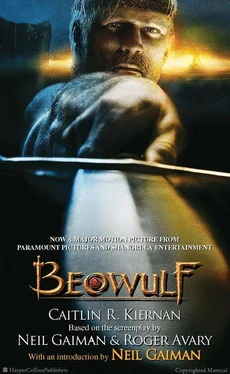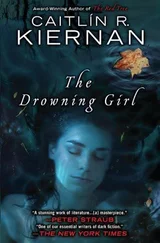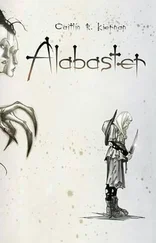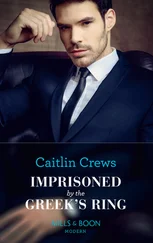Wiglaf catches sight of the thin Christian priest in his red robes, lurking near the queen and bearing the standard of Christ Jesus, but the Irishman has no formal role in these proceedings. These are the old ways, already fading from the land as a strange new religion takes hold, but they were the ways of Beowulf, and the ways of King Wiglaf, as well, and so will be honored and observed on this day.
Queen Wealthow stands hand in hand with Ursula, and Wiglaf hopes that together they may find some solace from their grief and horror. Wealthow will remain the Lady of Heorot, the Scylding Queen, though Wiglaf will respect her wishes and not ask her to be his wife.
The funeral ship sails beneath the arch, and as it exits the far side and makes for the open sea, the thanes tending the pyre use long poles to force it over the cliff. A brilliant firefall of glowing embers and flaming brands spills down from the rocks and rains across the masts and the deck of the dragon-prowed ship. In only a moment more, the entire ship is burning.
The scop’s song ends, and for a moment Wiglaf listens to the hungry roar of the flames, the waves and wind, the sad and gentle murmur from the crowd. The sun’s chariot has reached the horizon, and it seems to Wiglaf like an enormous crimson eye gazing out across the sea toward the burning ship and the mourners lining the shore. The burning sails of the funeral ship are framed in stark silhouette against that blazing eye. And finally King Wiglaf speaks, calling out loud to be heard.
“He was the bravest of us. The prince of all warriors. His name will live forever. He—” But then the lump in Wiglaf’s throat is too painful to say any more, and he turns away so no one will see the tears on his cheeks.
Now it is Wealthow’s turn to speak, and she does so despite her own tears.
“His song,” says the queen, “shall be sung forever. As long as the world endures, the tales of his brave deeds shall be told.”
And then there is only the wind and the surf once again, and Beowulf’s funeral ship has been carried out into the open water. Slowly, the mourners begin to turn away, filing along the road winding up through the cliffs to the keep. Wiglaf watches Wealthow and Ursula go, but he remains behind, determined to stand vigil as long as the ship floats, as long as it burns. His mind drifts back to a day thirty years before, he and Beowulf standing together on the listing deck in a howling, storm-wracked sea.
The sea is my mother! declared a grinning Beowulf. She spat me up years ago and will never take me back into her murky womb!
Then Wiglaf hears something on the wind, a wordless keening, and he peers out across the sea, seeking the source of the sound. As he stares at the sea, bloodied now by the setting sun and the flames of the funeral ship, the keening begins to take another shape, becoming a beautiful song, a song more exquisite than any that has ever reached his ears or that he has ever before thought possible.
The song, Wiglaf. Grendel’s mother, the merewife…
And then he sees her, the form of a woman astride the prow of the burning dragon ship. The sunset gleams off her naked skin, and then she slips silently into the sea. Relieved of its queer passenger, the boat lists to starboard and immediately begins to sink. Wiglaf leaves his place in the boulders and walks quickly down to the wet sand, where something metallic sparkles as it rolls to and fro in the foamy surf. At first he thinks it only some trinket that must have fallen from the dead king’s ship, perhaps thrown free by the impact of the firefall. But when he stoops to pick it up, he finds the golden drinking horn, twice lost and now returned once more. He picks it up, though some more cautious part of his mind suggests he would be better off leaving it be, turning about, and following the others back up the cliff to the keep. Wiglaf stands there with the sea lapping at his feet and holds the horn, realizing that he has not until this second fully appreciated the elegance of its craftsmanship. He glances back toward the sea, which is quickly growing dark as the sun slips away.
She is rising from the water, the gilt-skinned mother of the demon Grendel, the mother of the dragon who was Beowulf’s only son. She stops singing and smiles, beckoning Wiglaf with one long finger. Wiglaf takes a hesitant step toward her, the sea rushing about his ankles and seeming to draw him forward. He is only dimly aware of the burning funeral ship now, as its carved bow rises high into the air and lingers there a moment before sliding backward to be swallowed up by the ocean. The water hisses and steams as the deep accepts the mortal remains of Beowulf, son of Ecgtheow, into Ægir’s gardens.
“A man like you,” she says, “could own the greatest tale ever sung,” and Wiglaf, son of Weohstan, gazes deeply into the honeyed eyes of this woman from the sea. His mind is filled with the siren lure of her promises, but also does he clearly see the price he would pay, the price that so many other men have paid before him.
“A man like you ,” she says again and extends a hand to the Geat.
“Might walk any road that pleases him,” replies Wiglaf, and the icy sea slops at his feet. “I know you, she-demon, and I know you speak of glory and of wealth and renown, and but for what I’ve seen , it might appear the fairest gift ever offered a poor fishmonger’s son.”
“As you say,” the merewife smiles, for she is ancient and skilled at waiting games, having yet more time before her than any mortal man might ever comprehend.
And the Norns—Urðr, Verðandi, and Skuld—the three fates busily weaving beneath the roots of Yggdrasil, watch the progress of another cord held tight within their looms. For every single thread is a wonder to them, and so they spin and wait with the patience of all immortal things.
A Glossary of Norse, Icelandic, Old English, and Anglo-Saxon Terms Appearing in the Novel
Ægir —in Norse mythology, the personification of the sea and husband of the goddess Rán, father to nine daughters (the billows, waves); a synonym for “sea” in skaldic poetry. Ægir is sometimes described as a giant, though this seems unlikely.
aeglaeca —in reference to Grendel’s mother (“Grendles modor”); Anglo-Saxon, “awesome opponent,” “ferocious fighter.”
Æsir —the principal gods of the Norse pantheon, including Odin, Baldr, Bragi, Loki, Vé, Heimdall, etc.; excludes those gods referred to as the Vanir , with whom the Æsir do battle.
aglaec-wif —Anglo-Saxon, in reference to Grendel’s mother (“Grendles modor”); some controversy surrounds the correct translation of this phrase. The Dictionary of Old English translates it as “female warrior, fearsome woman.” Earlier authors translated it as “monster wife” and “monster woman,” but those same translations of Beowulf translate aglaeca and aeglaeca as “hero” or “warrior” when referring to Beowulf himself.
Árvak —Norse, “early riser,” one of the horses that draw the chariot of the sun goddess Sól.
Alsvin —Norse, “all swift,” one of the two horses that draw the chariot of the sun; also Alsvid .
Ásgard —the home of the Æsir, literally “enclosure-of-the-Æsir.”
Ásynja —feminine form of Æsir .
Audhumla —in the Norse creation myth, the first cow, who licked the first god, Búri, free from a block of salty ice.
Aurgelmir —“gravel-yeller,” father of the race of Frost Giants; also known as Ymir .
Bestla —a Frost Giant, mother of the gods Odin, Vé, and Vili, wife of Borr (Burr), daughter of Bolthorn.
Читать дальше











